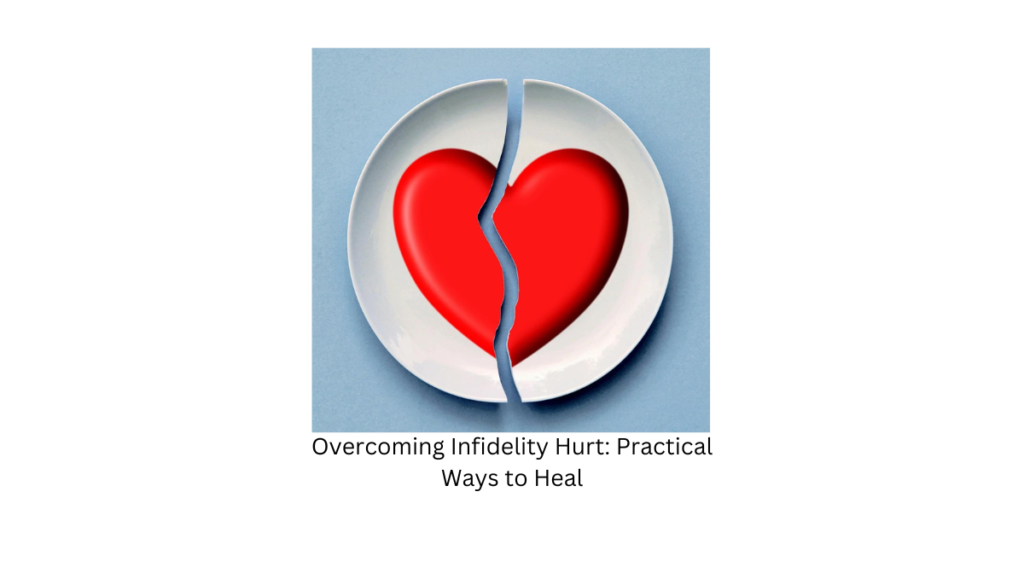Introduction:-
Overcoming Infidelity Hurt: Practical Ways to Heal Pain

Infidelity, the breach of trust in a committed relationship, can cause deep emotional wounds. The pain is often overwhelming, leaving those affected by it searching for ways to heal and move forward. While recovering from infidelity is never easy, there are practical ways to overcome the hurt and rebuild your life. In this article, we’ll explore some effective strategies for healing after infidelity.
“What are some practical strategies for healing and rebuilding one’s life after experiencing infidelity Hurt in a committed relationship?”

1. Allow Yourself to Feel
The first step in healing from infidelity is to acknowledge and accept your emotions. It’s natural to feel a wide range of emotions such as anger, betrayal, sadness, and confusion. Allow yourself to experience these feelings without judgment. Bottling up emotions can prolong the healing process, so it’s important to give yourself permission to grieve the loss of trust and the relationship as it once was.
2. Seek Support
You don’t have to go through this difficult time alone. Reach out to friends, family members, or a therapist who can provide emotional support and guidance. Talking to someone you trust can be cathartic, and a therapist can help you navigate the complex emotions that infidelity brings to the surface.
3. Set Boundaries
If you decide to work through the infidelity with your partner, it’s crucial to establish clear boundaries. These boundaries may include agreements on transparency, communication, and rebuilding trust. Setting and enforcing boundaries helps create a sense of safety in the relationship and prevents further hurt.
4. Consider Couples Counseling
Couples counseling can be an invaluable resource for couples trying to heal after infidelity. A trained therapist can facilitate open and honest communication between partners, provide tools for rebuilding trust, and help both individuals explore the underlying issues that led to the infidelity.
5. Focus on Self-Care
During this challenging time, prioritize self-care. Engage in activities that bring you joy and relaxation. Whether it’s practicing mindfulness, exercise, or pursuing hobbies, self-care is essential for maintaining your emotional well-being as you heal.
6. Practice Forgiveness
Forgiving a partner who has betrayed your trust is a complex and personal process. It doesn’t mean you condone the infidelity, but it allows you to release the heavy burden of resentment and anger. Forgiveness can be a powerful step towards healing, both for yourself and the relationship.
7. Reflect and Learn
Infidelity often reveals underlying issues within a relationship. Take time to reflect on what led to this situation. What were the contributing factors? Understanding these dynamics can help you make necessary changes for a healthier future, whether within the current relationship or in future ones.
8. Avoid Blame
It’s easy to fall into the trap of blame when dealing with infidelity. While it’s important to acknowledge responsibility where it’s due, constantly blaming yourself or your partner can hinder the healing process. Instead, focus on constructive ways to move forward.
9. Embrace Patience
Healing after infidelity is a journey, not a destination. It takes time to rebuild trust, and setbacks are common. Be patient with yourself and your partner as you navigate this difficult path together. Progress may be slow, but it is possible.
10. Consider Your Options
Ultimately, healing after infidelity may lead you to a crossroads. You must decide whether to continue the relationship or part ways. This decision is highly personal and should be made with careful consideration of your own needs and values.
Why is infidelity so painful?

Infidelity is incredibly painful for several reasons, both emotional and psychological:
- Breach of Trust: Trust is the foundation of any healthy and secure relationship. Infidelity shatters that trust, leaving the betrayed partner feeling deceived and betrayed by someone they thought they could rely on.
- Emotional Betrayal: Infidelity is not just a physical act; it’s often accompanied by emotional involvement with someone else. This emotional connection can feel like a deep betrayal because the cheating partner is sharing emotions and intimacy that should be reserved for the committed relationship.
- Loss of Security: A committed relationship provides a sense of security and stability. Infidelity destabilizes this, leaving the betrayed partner feeling vulnerable and uncertain about their future.
- Humiliation and Shame: Being cheated on can lead to feelings of humiliation and shame. The betrayed partner may question their self-worth and wonder what they did wrong to “cause” the infidelity, even though it’s not their fault.
- Broken Dreams: Many people enter into relationships with dreams of a future together, whether that’s marriage, children, or growing old together. Infidelity can shatter these dreams, leaving the betrayed partner mourning the loss of the future they envisioned.
- Insecurity and Jealousy: After infidelity, the betrayed partner may struggle with feelings of insecurity and jealousy. They might constantly worry about their partner’s fidelity and have difficulty trusting again.
- Emotional Rollercoaster: The discovery of infidelity often triggers a rollercoaster of emotions, including anger, sadness, confusion, and even depression. Coping with these intense emotions can be overwhelming.
- Distrust in Others: Infidelity can lead to a generalized distrust of others, not just the cheating partner. Betrayed individuals may find it challenging to trust anyone, which can impact their ability to form new relationships.
- Impact on Self-Esteem: Being cheated on can significantly impact self-esteem. The betrayed partner may question their attractiveness, worthiness, and desirability, leading to feelings of inadequacy.
- Physical Consequences: The emotional pain of infidelity can manifest in physical symptoms like headaches, stomachaches, and sleep disturbances. The stress and anxiety caused by infidelity can have real physical effects.
- Difficulty Forgiving: Forgiving a cheating partner can be incredibly difficult. The betrayed partner may struggle with forgiving and moving on, which can prolong the pain.
- Loss of Innocence: Infidelity can lead to a loss of innocence in the relationship. The betrayed partner may feel like their once-idealized partner is now tainted, and the relationship will never be the same.
It’s important to note that the pain of infidelity is highly individual and can vary based on the specific circumstances and the personalities of the individuals involved. Some people may be able to eventually heal and rebuild their relationship, while others may choose to end it to find healing and happiness elsewhere. Regardless of the path chosen, seeking support from a therapist or counselor can be invaluable in processing the pain and navigating the complex emotions that come with infidelity.
Conclusion
Healing from the hurt of infidelity is a challenging process that requires time, effort, and patience. While there are practical ways to navigate this difficult journey, it’s essential to remember that healing is a highly individual process. What works for one person may not work for another. The key is to prioritize your emotional well-being and make choices that align with your long-term happiness and fulfillment. Whether you choose to rebuild trust or move on, remember that you have the strength to overcome the pain of infidelity and emerge from this experience as a stronger, wiser person.